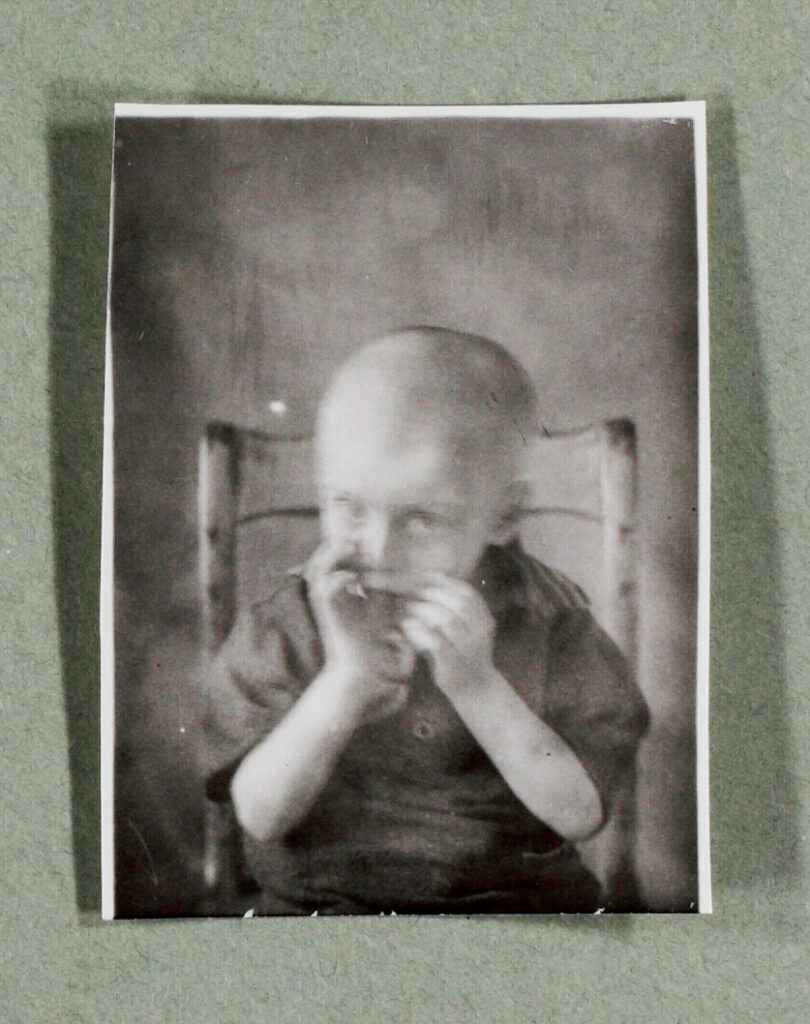
Hans-Herbert Niehoff at the age of four and a half, photograph taken at the Rotenburg Institutions of the Inner Mission, 1938.
NLA Hanover Hann. 155 Lüneburg Acc. 56/83 No. 334.
HANS-HERBERT NIEHOFF (1933 – 1942)
Hans-Herbert Niehoff lived to be eight years old. He was born on 30 October 1933 in Hanover. His parents were Hans-Hermann Niehoff, a chemist, and his wife Marie Niehoff, née Appel. At the age of seven months, his parents placed him in a children’s home in Hannover-Mecklenheide. On 30 November 1934, Hans-Herbert was admitted to the Heidehaus Hannover sanatorium due to severe pulmonary tuberculosis. When he was not even two years old, his mother Marie also died there of tuberculosis. It can be assumed that mother and child had contact with each other during their stay together.
After his mother’s death, it took another two years before the Heidehaus recommended that Hans-Herbert be admitted to the Hanover-Langenhagen State Hospital and Nursing Home. On 19 April 1937, he was admitted to the institution, initially only for observation. In the meantime, his father had moved to Algermissen in the district of Hildesheim. Upon arrival at the Hannover-Langenhagen institution, Hans-Herbert was described as »dull« and »stupid.« His diagnosis was »congenital mental deficiency.« This sealed his fate for the rest of his life.
On 31 May 1937, Hans-Herbert was transferred to the children’s ward, where he remained until his transfer to the Inner Mission Rotenburg institutions in 1938. The last entry before his transfer to Rotenburg read: »Occasional elevated temperature. Likes to jump around. Otherwise makes no progress. A low-spirited boy, even though he looks quite cute.«
In Rotenburg, Hans-Herbert was simply kept in custody. It was more than six months after his arrival that the first entry was made. Until his transfer to the »children’s ward« in Lüneburg, there were only two further entries, the last of which was momentous: »Makes no mental progress, does not play in an orderly manner, usually runs around aimlessly. Unable to learn.« Because his mother had died and his father was now serving as a medic at the front, the notification of his transfer to the »children’s ward« went directly to his grandmother.
Hans-Herbert Niehoff had spent almost his entire life in a home or institution when he died in Lüneburg on 30 March 1942 at the age of eight. The few entries in Hans-Herbert’s medical records from his time in Lüneburg indicate that he was almost certainly murdered. The file contains contradictory information about the cause and time of death.
Hans-Herbert’s grandmother Marta, who had custody of him because his father was serving at the front, was informed of her grandson’s death by post. It is unlikely that she or any other family member attended the funeral. There is no evidence that the family took any interest in their boy. During the seven years that Hans-Herbert lived in various institutions, his father and grandmother never once inquired about him. It was only after Hans-Herbert’s death that his father asked about his medical history. His grandmother was only interested in a rocking horse that had apparently been lost during his stays in various homes and institutions.
back